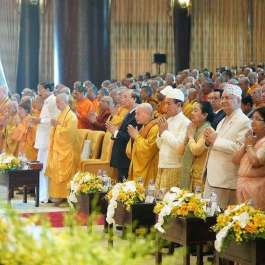
In some Buddhist communities, increasing prestige is accorded to those who earn a degree in Buddhist Studies. Monks and nuns who obtain a PhD in their field of research (and their numbers are growing) are particularly celebrated. Academic study is an extraordinary socio-economic shift in the Buddhist world, especially since the very idea of Buddhology is a recent phenomenon no older than the 1800’s (when Indology and Oriental Studies became popular in universities). For Ven. Analayo, from the Numata Centre of Buddhist Studies at the University of Hamburg, scholars will always have a duty to make academic information more accessible to the wider public. If this basic calling can be fulfilled, the benefits of an intellectually rigorous approach to Buddhism will be vast.
For example, let’s look at a significant milestone that is going to happen in February. At the University of Hamburg, an online course about bhikkhunis (nuns) is open for applications. A large segment of the course will be occupied with how female ordination is treated in the three canons of Buddhist law: the Theravada, Dharmaguptaka, and Mulasarvastivada Vinayas. “The main interest is not just a detailed comparison of the three Vinayas,” according to Ven. Analayo. “Each of these three Vinayas will be presented in a single lecture by a competent scholar in the field and then we move on to the actual situation in the respective countries.”
This is not the first time that Buddhist academia came together for an important discussion with real practitioners. Numerous books have already been written about the interaction between Buddhism and science, and some neuroscientists have built careers on collaborating with Buddhist monks. But this is perhaps the first specialist course devoted to the subject of women. Taught by Ven. Analayo and a team of researchers, this new course will help to spark interest and help students become more circumspect and self-reliant in their search for knowledge. “This will then enable deepening one’s understanding whenever required even in areas that have not been touched fully in the course,” he noted to me. “The academics involved will convey a first impression of their work and its relevance, so that those interested can then follow this up by reading their publications.”
In the sometimes-emotional debate about women’s ordination, it is easy to lose the benefit of doubt for the other side. This may seem especially easy for those of us who do advocate full ordination in the Theravada and Mulasarvastivada Vinayas. It seems unfathomable in this day and age that women of the Theravada and Mulasarvastivada traditions are prevented from full ordination and enjoy less support than monks. But this is an unfair conjecture. “The issue is in fact not so much one of ‘allowing ordination’ or not, I think, but of feeling entitled to grant ordination,” observes Ven. Analayo. “This is of course not an issue when a living tradition of fully ordained nuns exists, as in the Dharmaguptaka tradition in China and Korea, etc., but in the two traditions where this is not the case, the Theravada tradition and the Tibetan Mulasarvastivada Vinayas, there is a clear need to clarify the legal situation that enables or prevents the granting of higher ordination to nuns. Ordination is a formal legal act and for it to be effective and recognized it needs to be done according to the relevant legal regulations.” In other words, we need to allow the noblest argument possible for those against women’s ordination, which is that their monastic codes do not permit it.
Ven. Analayo’s position is informed not only by years of monastic experience, but also by extensive research into the Pali Vinaya. His resulting essay about the legality of ordaining nuns was a decisive publication. It laid out the legal basis for ordination on the terms critics of bhikkhuni ordination demanded. He continues on this intellectual trajectory by outlining the methodological problems surrounding this area of scholarship. “Discussions around these controversial issues require adequate information of the type that can result from sound academic research. All too often, opinions that are based on less than accurate perceptions keep circulating and influence the assessment of the situation, leading to decision taking processes that are not well informed. This makes it desirable to offer such an opportunity to get a deepened understanding and appreciation of the various aspects that are involved in such controversial issues as bhikkhuni ordination.”
I asked him about the possible bias and discrimination that have historically prevailed against women. “There is of course a gender bias, and this has a continuous presence from the early sources to present day. But I think it would be an oversimplification to attribute the situation only to this aspect,” he observed. “From the perspective of the Buddhist teaching on conditionality, there will always be various causes and conditions that influence a situation. A monocausal view will be like the famous simile of the blind men and the elephant, taking hold of one part and then believing it to be the whole thing. The course will hopefully be able to convey some of the complexities of the causes and conditions in this case.”
Ven. Analayo hopes that the course will broaden its students’ horizons, enabling them to understand better what motivates those who hold a different view from their own. For him, the value of learning Buddhist Studies is to be able to evaluate the situation based on what he sees as the convergence of academic research and meditation practice: knowledge and vision of things as they really are, which then can act as a guide for any action to be taken. This is how the academy can contribute to the living traditions, and deserves every sincere Buddhist’s serious attention.







